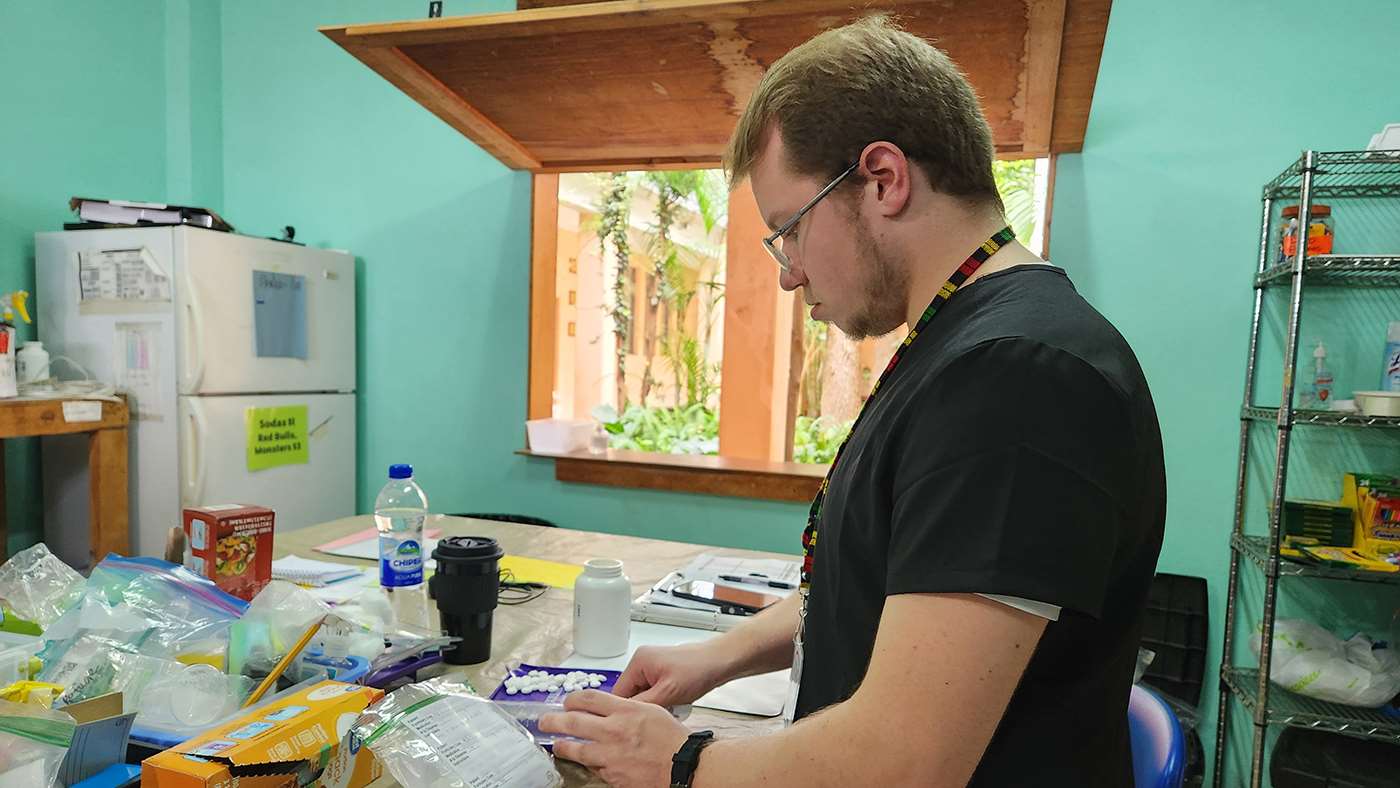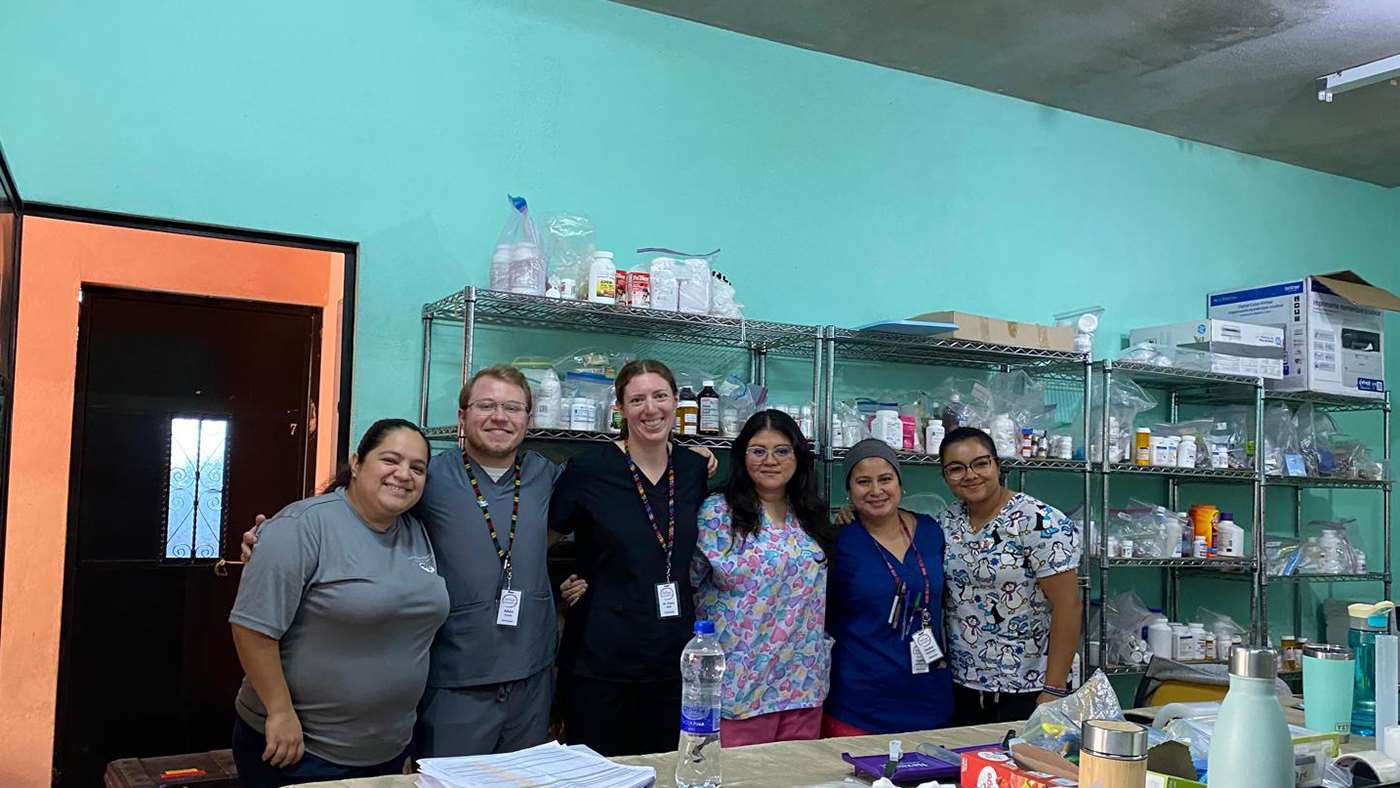School of Pharmacy Offers First International Clinical Rotation

MCW pharmacy student Adam Crouse prepares a prescription in the pharmacy within the community-owned hospital in rural San Raymundo, Guatemala.
The MCW School of Pharmacy has added a new experiential education opportunity for students interested in reducing global health inequities. Established in fall 2024, the international Advanced Pharmacy Practice Experience (APPE) is offered in collaboration with Refuge International, which organizes medical volunteer trips in Guatemala. The nonprofit focuses on bridging healthcare gaps in rural communities, especially for indigenous people with limited access to medical care.
Adam Crouse, a 2025 PharmD candidate, was the first MCW pharmacy student to participate in an international APPE rotation. He traveled with Stacy Reid, PharmD, BCPS, MCW assistant dean of experiential education and assistant professor, to San Raymundo, Guatemala, in October 2024. Residents in this remote region face limited healthcare access and common health issues such as malnutrition, infectious diseases, limited maternal care and language barriers (for those who speak Spanish or the local Mayan dialect).
This was Dr. Reid’s third international medical volunteer trip. Her first trip was to Belize as a pharmacy student in 2015; the other two trips were with Refuge International in Guatemala as a practicing pharmacist in 2022 and 2023.
“Participating in an international rotation when I was a pharmacy student helped me develop an appreciation for getting out of my comfort zone, working collaboratively and problem solving,” recalls Dr. Reid. “I advocated for current and future students at MCW to engage in this opportunity because I know it will be memorable and hopefully give them a new perspective on patient care.” Dr. Reid acknowledges that MCW’s Office of Global Health supports her efforts to organize the rotation for third-year PharmD students.
Refuge International operates out of the community-owned hospital (named “Llano de la Virgen”) in San Raymundo. The patient pays two dollars for any services they may need, which goes toward upkeep of the hospital (not to Refuge International). If a patient cannot pay this fee, however, they will not be turned away. The pharmacy is a patient’s last stop before leaving the building following a clinic appointment or surgery.
“This was an incredible immersive educational experience,” says Crouse. “It brought to life so many patient care lessons about resource-limited environments that we discuss in theory but rarely see firsthand.”
Crouse was responsible for managing medication distribution and overseeing limited medication inventory. For example, he carefully prioritized antibiotics with limited access to certain classes and, in some cases, specific formulations.
The pharmacy team (comprising Dr. Reid and Crouse as volunteers, plus translators who were native Guatemalans) had to balance the effectiveness of the available options with the severity of each patient’s condition and think creatively about substitutions when a preferred medication was not available.

(l to r) Alex Morales (Guatemalan director), Adam Crouse, Dr. Stacy Reid, and pharmacy translators.
Crouse also gained interprofessional experience working with physicians on medication management and with medical interpreters to ensure that patients understood their respective diagnoses and treatment plans.
Refuge International recently implemented an electronic medical record (EMR) system at the clinic to track patient histories and to provide a continuity of care that is rare in rural healthcare. The organization hopes to incorporate the pharmacy and operating room into the EMR system in the future.
“Working with Refuge International, volunteers experience healthcare delivery in challenging settings, helping them gain unique skills and a deeper appreciation for the impact they can have on a global scale,” Crouse notes. “For me, this experience emphasized the critical need for affordable access to essential medications and reinforced my commitment to addressing healthcare inequities.”
– Melissa Behling



